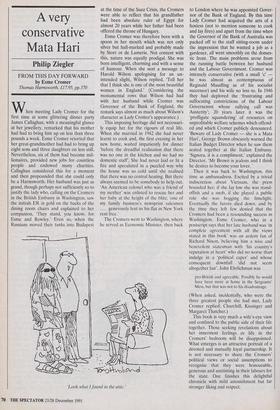A very conservative Mata Hari
Philip Ziegler
FROM THIS DAY FORWARD by Esme Cromer Thomas Harmsworth, £179.5, pp.370 When meeting Lady Cromer for the first time at some glittering dinner party James Callaghan, with a meaningful glance at her jewellery, remarked that his mother had had to bring him up on less than three pounds a week. Esme Cromer retorted that her great-grandmother had had to bring up eight sons and three daughters on less still. Nevertheless, six of them had become mil- lionaires, provided new jobs for countless people and endowed many charities. Callaghan considered this for a moment and then propounded that she could only be a Harmsworth. Her husband was just as grand, though perhaps not sufficiently so to justify the lady who, calling on the Cromers in the British Embassy in Washington, saw the initials ER in gold on the backs of the dining room chairs and explained to her companion, 'They stand, you know, for Esme and Rowley.' Even so, when the Russians moved their tanks into Budapest
at the time of the Suez Crisis, the Cromers were able to reflect that his grandfather had been absolute ruler of Egypt for almost 20 years while her father had been offered the throne of Hungary.
Esme Cromer was therefore born with a spoon in her mouth which was not only silver but hall-marked and probably made by Storr or de Lamerie. Not content with this, nature was equally prodigal. She was born intelligent, charming and with a sense of humour. When she sent a message to Harold Wilson apologising for an un- intended slight, Wilson replied, 'Tell her that I think she is one of the most beautiful women in England.' (Considering the monumental rows that Wilson had had with her husband while Cromer was Governor of the Bank of England, the remark says almost as much about Wilson's character as Lady Cromer's appearance.) This imposing heritage did not necessari- ly equip her for the rigours of real life. When she married in 1942 she had never learnt to cook and, the first evening in her new home, waited impatiently for dinner `before the dreadful realisation that there was no one in the kitchen and we had no domestic staff. She had never laid or lit a fire and speculated in a puzzled way why the house was so cold until she realised that there was no central heating. But there always seemed to be somebody to help out. `An American colonel who was a friend of my mother' was enlisted to rescue her and her baby at the height of the blitz; 'one of my family business's newsprint salesmen ... generously lent us his flat in New York rent free.'
The Cromers went to Washington, where he served as Economic Minister, then hack 'Look what I found in the attic.' to London where he was appointed Gover- nor of the Bank of England. By this time Lady Cromer had acquired the arts of a hostess (not to mention someone to cook and lay fires) and apart from the time when the Governor of the Bank of Australia was packed off to the staff sitting-room under the impression that he wanted a job as a gardener, all went smoothly on the domes- tic front. The main problems arose from the running- battle between her husband and the Labour Government. Cromer was intensely conservative (with a small 'c' he was almost as contemptuous of Reginald Maudling as of his socialist successor) and his wife no less so. In 1946 they had deplored the 'frustrating and suffocating constrictions of the Labour Governemnt whose rallying call was Austerity'; 20 years later it was the `profligate squandering' of resources on unprofitable welfare schemes which offend- ed and which Cromer publicly denounced. `Beware of Lady Cromer — she is a Mata Hari', George Brown obscurely warned the Italian Budget Director when he saw them seated together at the Italian Embassy. `Signora, it is a compliment,' explained the Director. 'Mr Brown is jealous and I think he desires to become your lover. '
Then it was hack to Washington, this time as ambassadress. Excited by a trivial indiscretion about Vietnam, the press hounded her; if she lay low she was stand- offish and a snob, if she played a public role she was hogging the limelight. Eventually the furore died down, and by the time they left few denied that the Cromers had been a resounding success in Washington. Esme Cromer, who in a postscript says that her late husband was 'in complete agreement with all the views stated in this hook' was an ardent fan of Richard Nixon, believing him a wise and benevolent statesman with his country's reputation at heart' who did no worse than indulge in a 'political caper' and whose consequent downfall 'did not seem altogether fair'. John Ehrl ich man was pro-British and agreeable. Possibly he would have been more at home in the Sergeants' Mess, but that was not to his disadvantage.
(When asked, incidentally, who were the three greatest people she had met, Lady Cromer replied: Churchill, Kissinger and Margaret Thatcher.)
This book is very much a wife's-eye view and confined to the public side of their life together. Those seeking revelations about her innermost feelings or life in the Cromers' bedroom will be disappointed. What emerges is an attractive portrait of a devoted and mutually loyal partnership. It is not necessary to share the Cromers' political views or social assumptions to recognise that they were, honourable, generous and unstinting in their labours for the state. One finishes this delightful chronicle with mild astonishment but far stronger liking and respect.










































































































 Previous page
Previous page